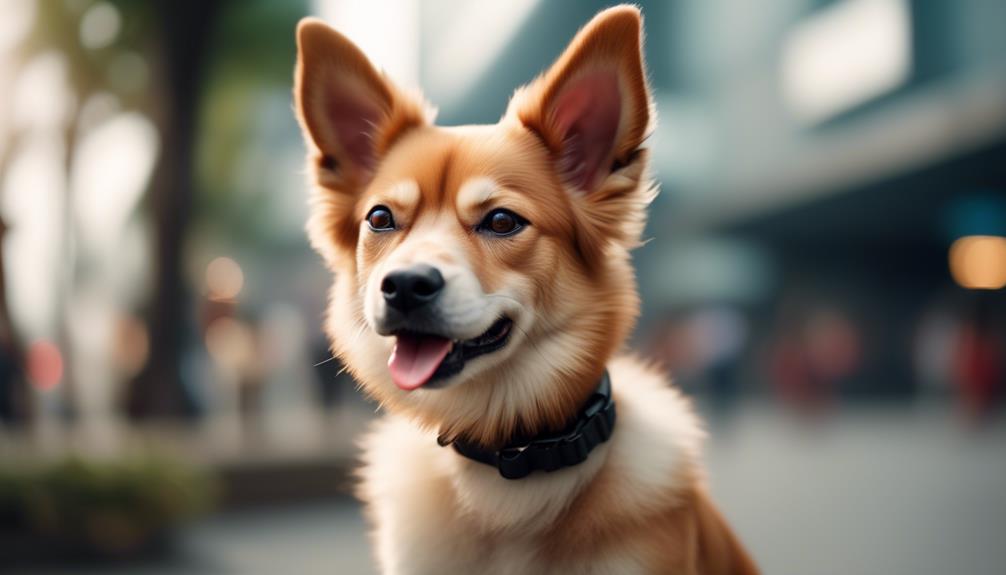
Have you ever wondered if the Taiwan Dog, with its rich history and unique traits, could be the perfect companion for you?
There is a theory that suggests this medium-sized Spitz breed, originating from Taiwan, possesses a remarkable adaptability to apartment living. But is this theory true?
Well, you’re about to find out as we delve into the intriguing world of the Taiwan Dog, exploring its temperament, exercise needs, and fascinating history.
Get ready to discover whether this loyal and intelligent breed could be the ideal addition to your life.
Key Takeaways
- The Taiwan Dog is a medium-sized breed with a short, dense, double coat in various colors.
- They are known for their loyalty, affection, intelligence, independence, and stubbornness.
- The breed has high energy levels and requires plenty of exercise.
- Potential health problems include patellar luxation, hip dysplasia, and progressive retinal atrophy (PRA).
Origin and Background
The Taiwan Dog has a rich and fascinating origin and background that dates back thousands of years. These dogs are descendants of ancient ancestors that traveled with Taiwan Aboriginals. They worked together in hunting and weren’t completely domesticated.
Efforts to bring back the breed in the 1970s were successful, and the Taiwan Dog is now recognized as a distinct breed. This breed is highly intuitive and intelligent, forming a strong bond with their caretaker. However, they can be wary of strangers, so socialization training is essential.
Consistent and firm training is also necessary to ensure their well-being. The Taiwan Dog’s origin and background contribute to their unique personality and characteristics, making them a fascinating breed to learn about.
See another Dog breed profile.
Terripoo Mixed Dog Breed
Size and Breed Group
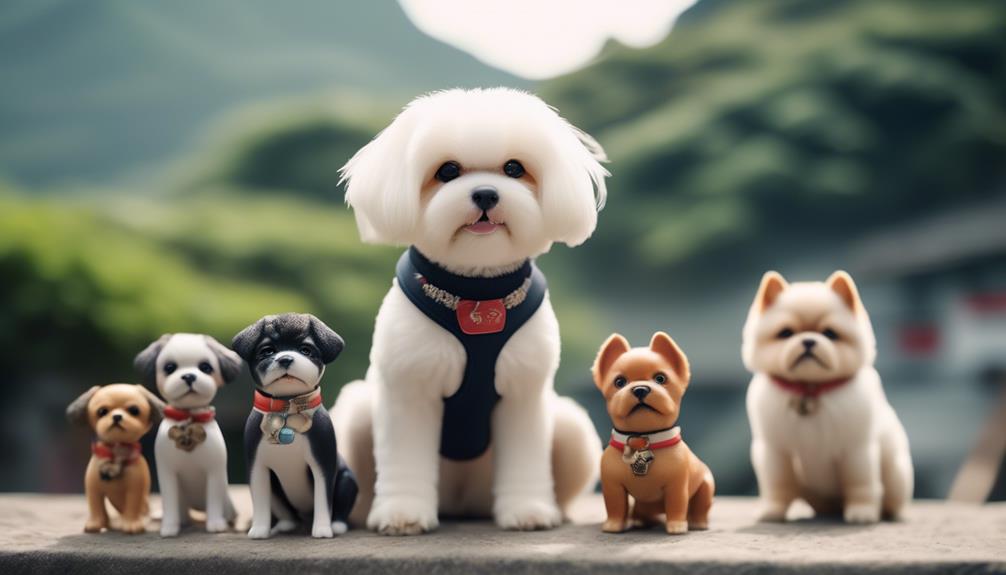
When considering the Taiwan Dog, it’s important to understand its size and breed group. This medium-sized dog belongs to the Spitz breed group, known for their distinctive appearance and characteristics.
Here are two factors to consider:
- Size: The Taiwan Dog falls into the medium size category, which means it isn’t too small or too large. This makes it suitable for various living environments, including apartments or houses with moderate space.
- Spitz Breed Group: As a member of the Spitz breed group, the Taiwan Dog shares common traits with other Spitz breeds, such as pointed ears, a curled tail, and a thick double coat. These characteristics are adaptations to harsh climates and make them well-suited for colder regions.
Understanding the size and breed group of the Taiwan Dog can help you make an informed decision when considering this unique and loyal companion.
Lifespan and Coat Characteristics
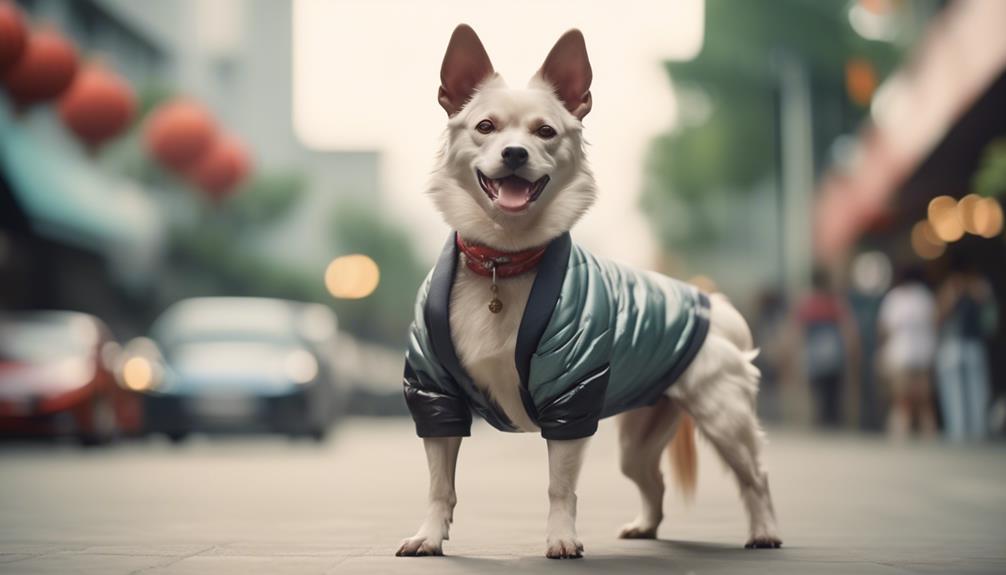
With an average lifespan of 10-13 years, the Taiwan Dog is known for its short, dense, and double coat in a variety of colors. This breed’s coat provides protection against Taiwan’s harsh climate and is relatively easy to maintain.
The short length helps to prevent matting and tangling, reducing the need for frequent grooming. Additionally, the dense and double coat offers insulation, which is beneficial in both hot and cold weather conditions.
The Taiwan Dog’s coat comes in various colors, including black, white, brown, and brindle. This variety adds to the breed’s unique and attractive appearance.
Regular brushing and occasional bathing will help keep the coat clean and healthy, ensuring that your Taiwan Dog looks and feels its best.
Temperament and Personality Traits
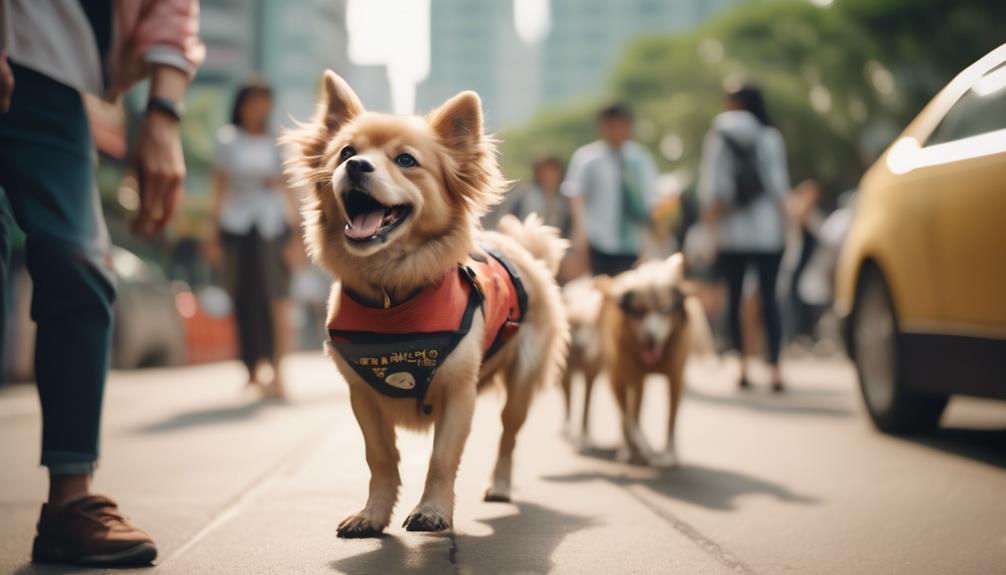
Now let’s explore the temperament and personality traits of the Taiwan Dog, a breed known for its unique characteristics.
When it comes to their temperament, Taiwan Dogs are known to be loyal, affectionate, and intelligent. They form a strong bond with their caretaker and are highly intuitive. However, they can also be independent and stubborn at times, requiring consistent and firm training.
In terms of their personality, Taiwan Dogs are wary of strangers and need proper socialization training to feel comfortable around new people. They’ve a moderate prey drive and may have a tendency to bark. Additionally, they’ve high energy levels and require plenty of exercise to keep them happy and fulfilled.
Exercise Needs and Training Difficulty
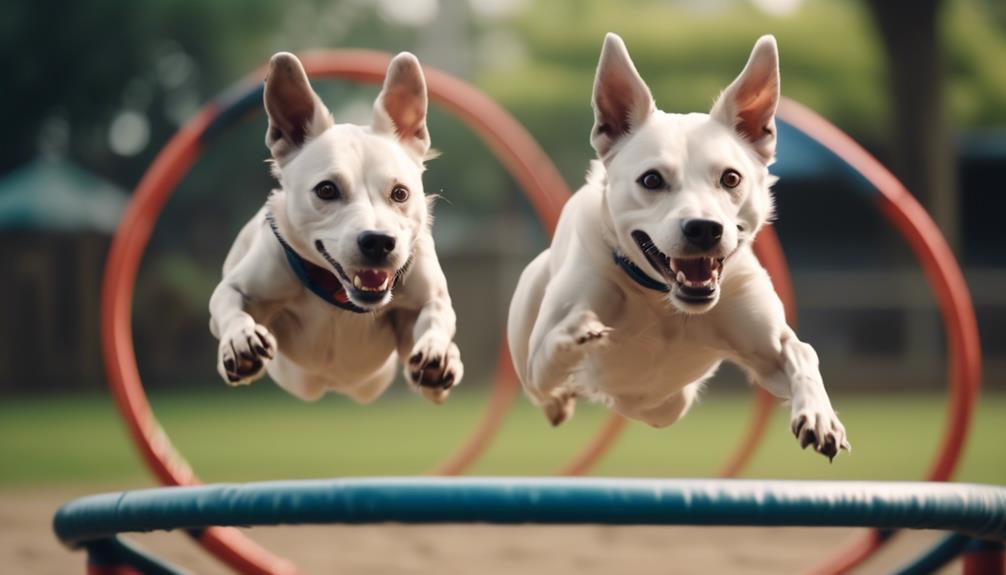
Exercise with the Taiwan Dog is essential due to their high energy levels and need for physical activity. These dogs are not well-suited for apartment living as they require plenty of exercise to stay happy and healthy. They have a moderate difficulty level when it comes to training, so consistent and firm training is necessary. To help you understand the exercise needs and training difficulty of the Taiwan Dog, here is a table outlining their characteristics:
| Exercise Needs | Training Difficulty |
|---|---|
| High energy | Moderate |
| Needs plenty of exercise | Consistent and firm training required |
Health Concerns and Genetic Tracing

Health concerns and genetic tracing reveal important insights into the Taiwan Dog breed.
When considering the health of Taiwan Dogs, it’s essential to be aware of potential issues such as patellar luxation, hip dysplasia, and progressive retinal atrophy (PRA). Regular veterinary checkups are crucial to monitor and address these conditions.
Genetic tracing has shown that the breed has roots dating back between 10,000 and 20,000 years, highlighting their long history and unique genetic makeup. Understanding the genetic background of Taiwan Dogs can help breeders make informed decisions to improve the breed’s health and well-being.
Additionally, genetic tracing provides valuable information about the breed’s ancestry and evolution, shedding light on its fascinating journey throughout the centuries.
Apartment Living Considerations
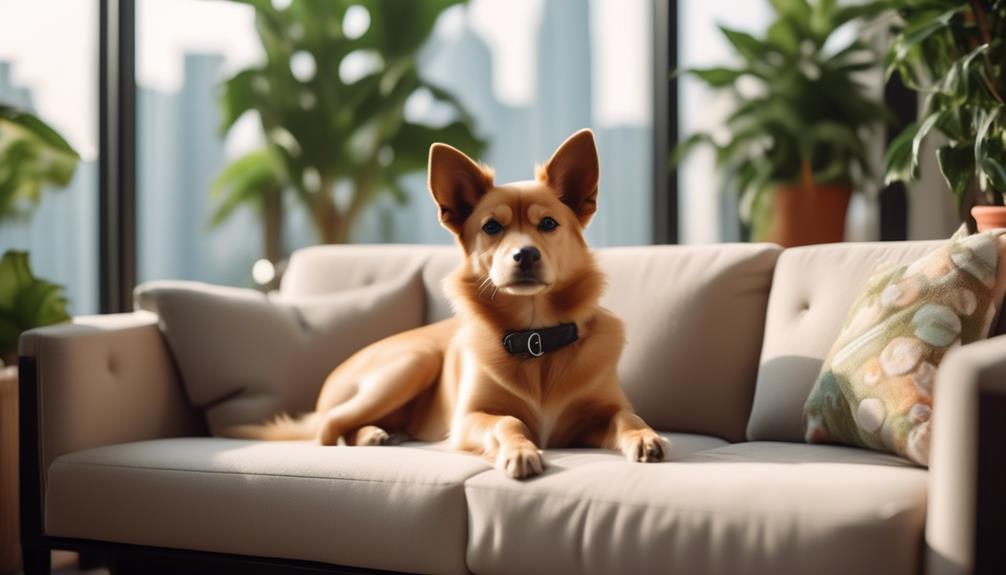
When choosing a dog for apartment living, it is important to consider various factors beyond just size alone. While size can be a consideration, there are other important things to think about to ensure a harmonious living situation for both you and your furry friend. To help you in your decision-making process, here is a handy table outlining some key considerations:
| Factors to Consider | Dogs Not Well Suited for Apartments |
|---|---|
| Size | Large breeds |
| Energy Levels | High energy breeds |
| Behavior | Excessive barkers, high prey drive |
Choosing a Dog for an Apartment
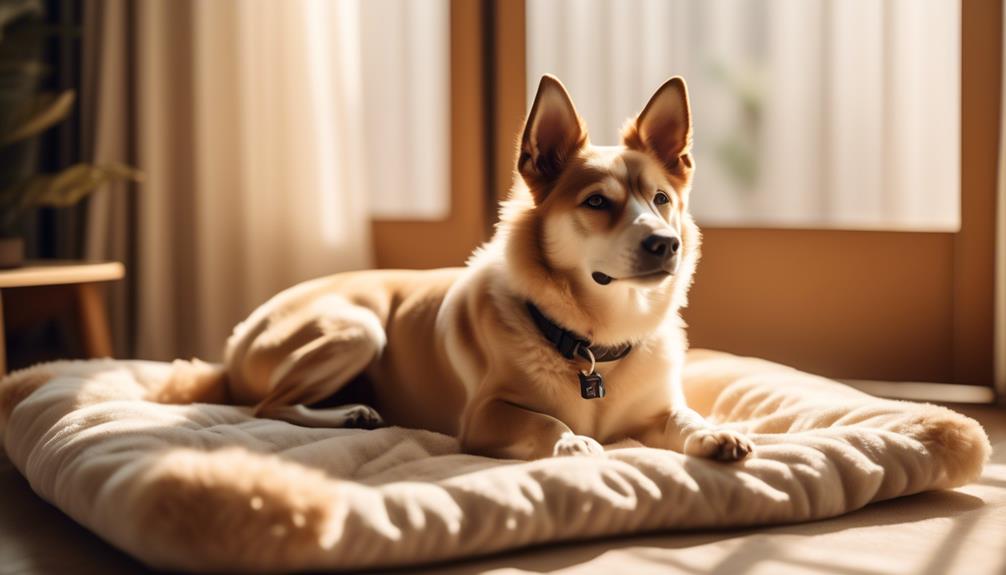
To ensure a harmonious living situation in your apartment, it’s important to carefully consider the factors that make a dog well suited for apartment living. Here are a few things to keep in mind:
- Dogs not well suited to apartment living:
- High-energy breeds that need a lot of space to run and play.
- Breeds with a tendency to bark excessively.
Consider neighbors’ comfort:
- Look for a dog with a calm and quiet temperament.
- Avoid breeds that have a strong prey drive or tendency to wander.
Desirable qualities in an apartment dog:
- Size is important, but it shouldn’t be the sole determinant.
- Look for a dog with moderate energy levels and a calm demeanor.
Friendliness and Family Affection
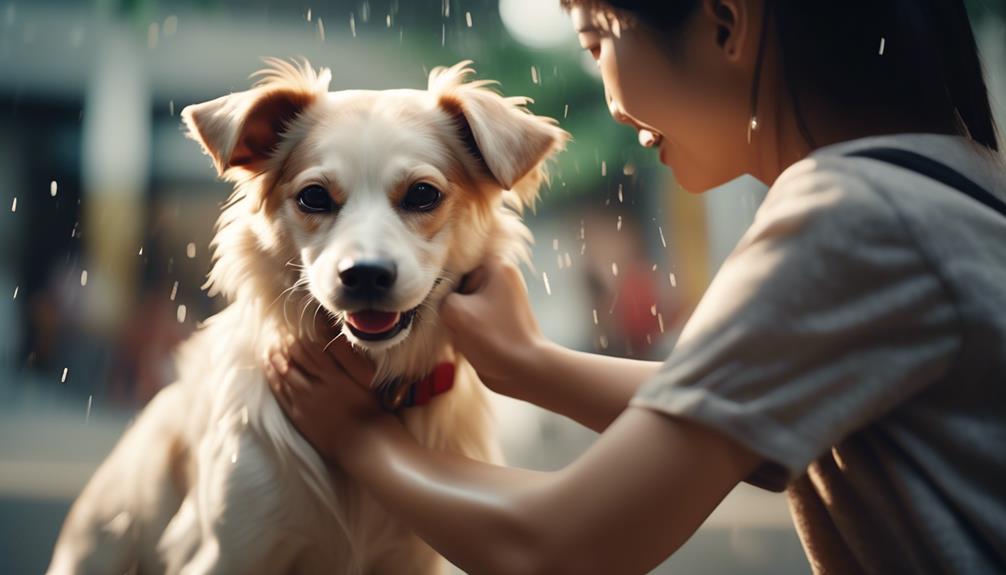
After considering the factors that make a dog well suited for apartment living, it’s important to understand the friendliness and affection that a Taiwan Dog can bring to your family. This breed is known for its all-around friendliness and affectionate nature towards its family members. They form strong bonds with their caretakers and are highly intuitive and intelligent. However, it’s important to note that Taiwan Dogs can be wary of strangers and require proper socialization training. Their energy levels are high, and they require daily exercise to keep them happy and healthy. To paint a clearer picture, here is a table highlighting the friendliness and family affection of a Taiwan Dog:
| Friendliness | Affection | Socialization | Exercise Needs | Energy Levels |
|---|---|---|---|---|
| High | High | Required | High | High |
As you can see, a Taiwan Dog is a friendly and affectionate companion that will bring joy and love to your family.
Behavioral Characteristics and Prey Drive

The Taiwan Dog exhibits distinct behavioral characteristics and a natural prey drive. As a potential owner, it’s important to understand these traits to provide appropriate care and training. Here are some key points to consider:
Behavioral Characteristics:
- Intelligent and independent nature
- Loyal and affectionate towards their family
- Strong bond with a primary caretaker
- Wary of strangers, requires socialization training
- Requires consistent and firm training
Prey Drive:
- Natural instinct to chase and hunt prey
- May exhibit high energy levels and intensity during playtime
- Potential for barking tendencies and wanderlust
- Needs ample exercise and mental stimulation to channel their prey drive
- Training and socialization can help manage their prey drive effectively
Energy Levels and Exercise Requirements
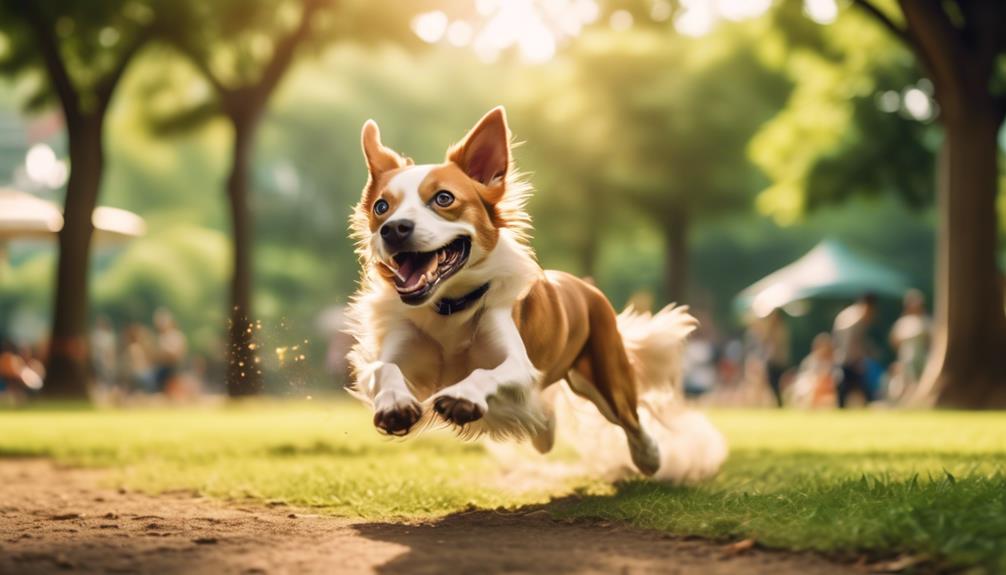
Understanding the energy levels and exercise requirements of the Taiwan Dog is essential for providing them with a healthy and fulfilling lifestyle. As a medium-sized breed with high energy levels, Taiwan Dogs need plenty of exercise to keep them physically and mentally stimulated.
Daily walks, runs, or play sessions are necessary to meet their exercise needs. They thrive in an environment that allows them to engage in activities that challenge their agility and intelligence. Interactive toys, agility training, and obedience classes are great ways to provide mental stimulation for this intelligent breed.
Keep in mind that Taiwan Dogs aren’t well-suited for apartment living and require a secure and spacious area to play and explore. Regular exercise and mental stimulation will help prevent behavioral issues and ensure a happy, well-rounded Taiwan Dog.
History of the Taiwan Dog

Taiwan Dog has a rich and fascinating history that dates back thousands of years. This breed’s history can be divided into two main periods: ancient times and modern times.
Ancient Times:
- Ancient ancestors of the Taiwan Dog traveled with Taiwan Aboriginals.
- They worked together in hunting and weren’t completely domesticated.
- This breed played a crucial role in the survival and well-being of the aboriginal communities.
Modern Times:
- In the 1970s, efforts were made to bring back the Taiwan Dog breed.
- These efforts included locating and breeding purebred individuals.
- The breed’s population gradually increased, and it gained recognition both locally and internationally.
The history of the Taiwan Dog is a testament to its resilience and adaptability. From its ancient roots to its modern revival, this breed continues to captivate dog enthusiasts worldwide.
Personality Traits and Socialization Needs
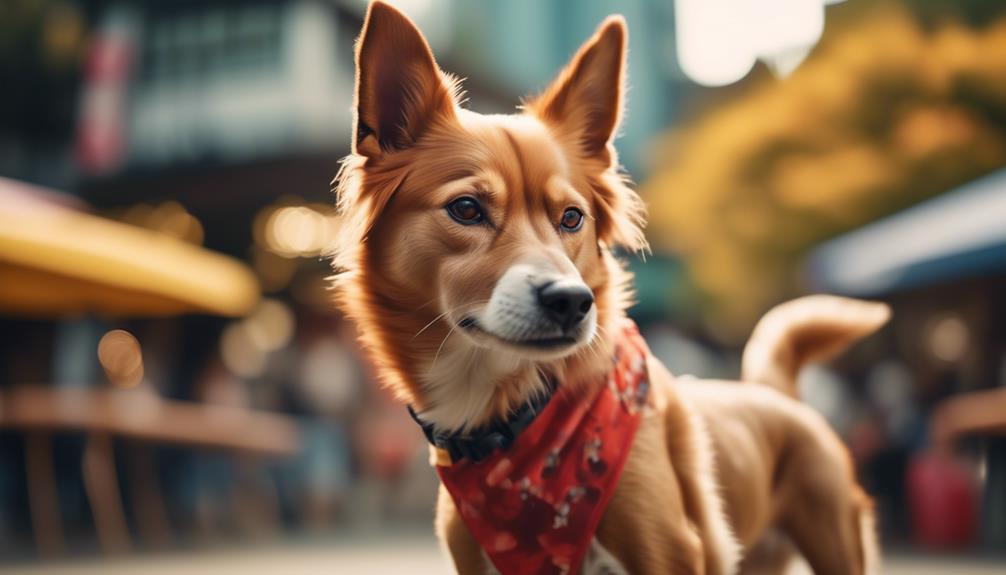
When considering the Taiwan Dog, it is important to understand their distinctive personality traits and their socialization needs. This breed is highly intuitive and intelligent, forming a strong bond with one caretaker. However, they can be wary of strangers, which is why socialization training is crucial. Taiwan Dogs require consistent and firm training to ensure they understand their boundaries and behave appropriately. To give you a clearer picture, here is a table highlighting their personality traits and socialization needs:
| Personality Traits | Socialization Needs |
|---|---|
| Loyal | Requires early and ongoing socialization to prevent fearfulness and aggression towards strangers |
| Affectionate | Exposure to various environments, people, and animals to promote confidence and adaptability |
| Intelligent | Positive experiences with new situations and stimuli to prevent fearfulness and anxiety |
| Independent | Opportunities to interact with other dogs and learn appropriate social behaviors |
Health, Care, and Feeding Guidelines

To ensure the well-being of your Taiwan Dog, it’s important to understand the necessary health, care, and feeding guidelines. Here are some key points to keep in mind:
- Health:
- Regular veterinary checkups are essential for maintaining your dog’s overall health and catching any potential issues early.
- Common health problems to watch out for include hip dysplasia, elbow dysplasia, cataracts, progressive retinal atrophy (PRA), and luxating patella.
- Care:
- Your Taiwan Dog has high energy levels and requires daily exercise to stay happy and healthy.
- Regular ear and nail care, as well as oral health maintenance, are important aspects of your dog’s overall care.
- Feeding:
- Follow feeding guidelines provided by your veterinarian to ensure your dog receives the appropriate amount of food.
- Consider your dog’s dietary needs and choose a high-quality dog food that meets those requirements.
Frequently Asked Questions
Are Taiwan Dogs Good With Children and Other Pets?
When considering if Taiwan Dogs are good with children and other pets, it’s important to note that every dog is different. However, in general, Taiwan Dogs can be good with proper socialization and training.
How Often Should Taiwan Dogs Be Groomed?
Taiwan Dogs should be groomed regularly to maintain their coat’s health and cleanliness. This includes brushing their short, dense, double coat to prevent matting and shedding. Aim for grooming sessions at least once a week.
What Type of Training Methods Work Best for Taiwan Dogs?
When training a Taiwan Dog, positive reinforcement methods work best. Use treats, praise, and play as rewards for good behavior. Be patient, consistent, and firm in your training approach to establish a strong bond and teach them effectively.
Can Taiwan Dogs Be Left Alone for Long Periods of Time?
No, Taiwan dogs should not be left alone for long periods of time. They are highly social and require human companionship. Leaving them alone for extended periods can lead to separation anxiety and behavioral issues.
Do Taiwan Dogs Have a High Prey Drive?
Yes, Taiwan Dogs have a high prey drive. They are descendants of hunting dogs and still retain their instinct to chase small animals. Proper training and socialization can help manage this behavior.
Conclusion
In conclusion, if you’re looking for a loyal and intelligent companion that can adapt well to apartment living, the Taiwan Dog is a great choice.
With its affectionate and independent nature, this medium-sized dog isn’t only aesthetically pleasing but also makes a wonderful addition to any family.
While training may be moderately challenging due to their stubbornness, the Taiwan Dog’s all-around friendliness and adaptability make it a fantastic pet for any living situation.




